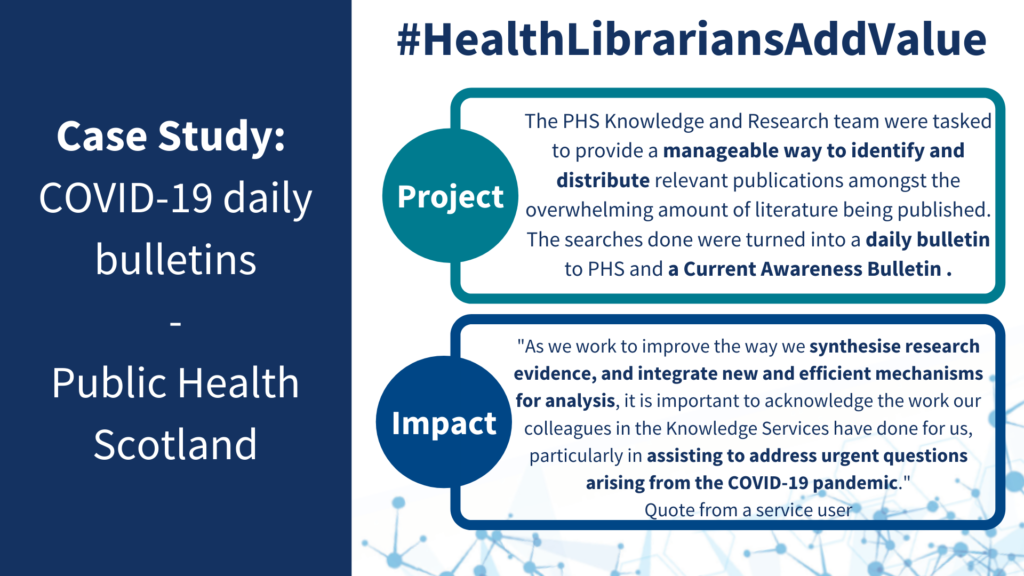COVID-19 daily bulletins
This case study is part of Health Librarians Add Value, a campaign run jointly by NHS Education for Scotland (NES) and CILIPS. It has been provided by Christine Gallagher, Librarian at Public Health Scotland. Read other case studies here.
Outline of the project
The Knowledge and Research Services team at Public Health Scotland had a request from the Guidance Cell at the start of the COVID-19 pandemic to provide a manageable way to identify and distribute relevant publications amongst the overwhelming amount of literature being published. There were many conversations to establish specific aspects of the disease the group members were looking for and this adapted over time as more became known about the disease and their work changed. Initially, the group was interested in information to answer a list of around 25 questions relating to the disease but after about six weeks, this had been replaced with three high-interest topics: transmission, high risk, and severity of COVID-19.
It was important to establish sources of information that were reliable and of good quality. This was made trickier by the vast amounts of publications relating to COVID-19 and the fact that many were being made available online as pre-prints without any peer-reviewing. Work was done to identify databases, websites, publisher portals, and other high-quality sources of research and publications. The initial list was shared with the Guidance cell, who provided feedback and suggestions and it was adapted as more sources became available throughout the pandemic.
The search strategy was created by identifying relevant keywords and subject headings from discussions with the Guidance Cell and adapting search strategies used by other organisations and found on websites, databases, resource lists, mailing lists etc. The search strategy was continually adjusted due to new information becoming available, such as the virus being named as Sars-CoV-2 and the disease being named COVID-19. Member of the Guidance Cell played an active part in the creation of the search strategy and would often provide feedback and suggest search terms to be included.
It was decided that, due to the vast quantity of publications, this information should be provided to the Guidance Cell on a daily basis. A list of references including abstracts and links to the papers online was created every weekday. This was saved in a folder in a shared drive and also in a shared folder in Refworks as this was most convenient for the team. To ensure that this information could also be seen by a wider audience, the daily update was also formatted into a weekly current awareness bulletin. This was supported by a library assistant in the Knowledge and Research Services team who collated the references and created a longer weekly bulletin. This was uploaded onto the NHS Scotland national Covid-19 Knowledge Service portal alongside other relevant bulletins. More recently, the bulletins have been made available on the national Current Awareness resources area of The Knowledge Network.
Impact
This work done by the Knowledge and Research Services team at Public Health Scotland has been valued by service users.
The following quote is from Dr Alex Sánchez-Vivar, Epidemiologist – Healthcare Scientist, Scottish Health Protection Network (SHPN) – Guidance Team:
The Guidance Cell (Public Health Scotland) responding to the COVID-19 pandemic has repeatedly signalled our ambition for the use of the most accurate, timely and up-to-date evidence to inform the development of current public health national guidance. The daily support provided by the Knowledge Services team has been crucial to deliver this ambition, while aware of the increasing volume of literature available and also the significant areas of uncertainty arising during the pandemic.
As we work to improve the way we synthesise research evidence, and integrate new and efficient mechanisms for analysis, it is important to acknowledge the work our colleagues in the Knowledge Services have done for us, particularly in assisting to address urgent questions arising from the COVID-19 pandemic. We trust that we can continue this collaboration and perhaps even explore new approaches in the way information is labelled, linked and shared, with the ultimate aim to ensure the quality and validity of data and evidence used to inform our guidance
Librarian Christine Gallagher outlines how important the work has been:
This was a new and quickly evolving project that required expert input from Knowledge and Research Services to provide the most up-to-date and best quality evidence to support guidance relating to COVID-19. This saved the Guidance Cell time and resources and it ensured that they consistently had the information and evidence required.
